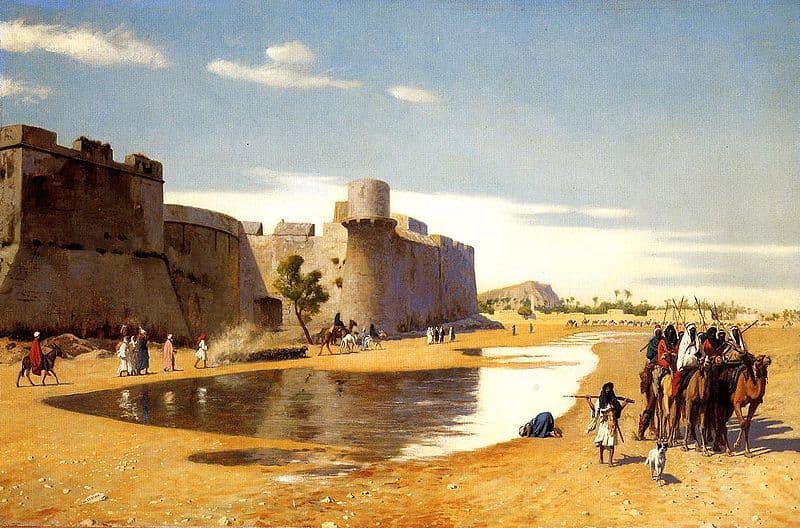Poem of the Day: ‘The Gates of Damascus’
Before dying from tuberculosis at age 30, James Elroy Flecker produced interesting poems while working for the British consular service in the eastern Mediterranean

James Elroy Flecker (1884–1915) is an anomaly. If not quite a poet “not only singular in his generation but in our Literature,” as his biographer once grandly claimed, he had at least a curious tone to his work — a tone of the Middle East that would suffer as, over the past forty years, the charge of “orientalism” became destructive of a poet’s reputation.
Still, even in the brevity of his work before his death from tuberculosis at age 30, he produced interesting poems while working for the British consular service in the eastern Mediterranean, with such collections as “The Bridge of Fire” (1907), “Thirty-Six Poems” (1910), “Forty-Two Poems” (1911), “The Golden Journey to Samarkand” (1913), and “The Old Ships” (1915), along with a novel and two plays. You can hear the interesting tone in such poems as “The Bridge of Fire”:
Between the pedestals of Night and Morning,
Between red Death and radiant Desire,
With clamour of delight and doubt and warning
The High Gods stand upon the Bridge of Fire.
Or, even more, in today’s Poem of the Day, an extract from the beginning of his 1913 poem “The Gates of Damascus.” In rhymed couplets, mostly of eight feet, Flecker captures the spookiness imagined for the alien East: “Pass not beneath, O Caravan, or pass not singing. Have you heard / That silence where the birds are dead yet something pipeth like a bird?”
The Gates of Damascus (opening lines)
by James Elroy Flecker
This is the song of the East Gate Warden
When he locks the great gate and smokes in his garden.
Postern of Fate, the Desert Gate, Disaster’s Cavern, Fort of Fear,
The Portal of Baghdad am I, and Doorway of Diarbekir.
The Persian Dawn with new desires may net the flushing mountain spires:
But my gaunt buttress still rejects the suppliance of those mellow fires.
Pass not beneath, O Caravan, or pass not singing. Have you heard
That silence where the birds are dead yet something pipeth like a bird?
Pass not beneath! Men say there blows in stony deserts still a rose
But with no scarlet to her leaf — and from whose heart no perfume flows.
Wilt thou bloom red where she buds pale, thy sister rose? Wilt thou not fail
When noonday flashes like a flail? Leave nightingale the caravan!
Pass then, pass all! “Baghdad!” ye cry, and down the billows of blue sky
Ye beat the bell that beats to hell, and who shall thrust you back? Not I.
The Sun who flashes through the head and paints the shadows green and red,
The Sun shall eat thy fleshless dead, O Caravan, O Caravan!
And one who licks his lips for thirst with fevered eyes shall face in fear
The palms that wave, the streams that burst, his last mirage, O Caravan!
And one — the bird-voiced Singing-man — shall fall behind thee, Caravan!
And God shall meet him in the night, and he shall sing as best he can.
And one the Bedouin shall slay, and one, sand-stricken on the way
Go dark and blind; and one shall say — “How lonely is the Caravan!”
Pass out beneath, O Caravan, Doom’s Caravan, Death’s Caravan!
I had not told ye, fools, so much, save that I heard your Singing-man.
___________________________________________
With “Poem of the Day,” The New York Sun offers a daily portion of verse selected by Joseph Bottum with the help of the North Carolina poet Sally Thomas, the Sun’s associate poetry editor. Tied to the day, or the season, or just individual taste, the poems are drawn from the deep traditions of English verse: the great work of the past and the living poets who keep those traditions alive. The goal is always to show that poetry can still serve as a delight to the ear, an instruction to the mind, and a tonic for the soul.
